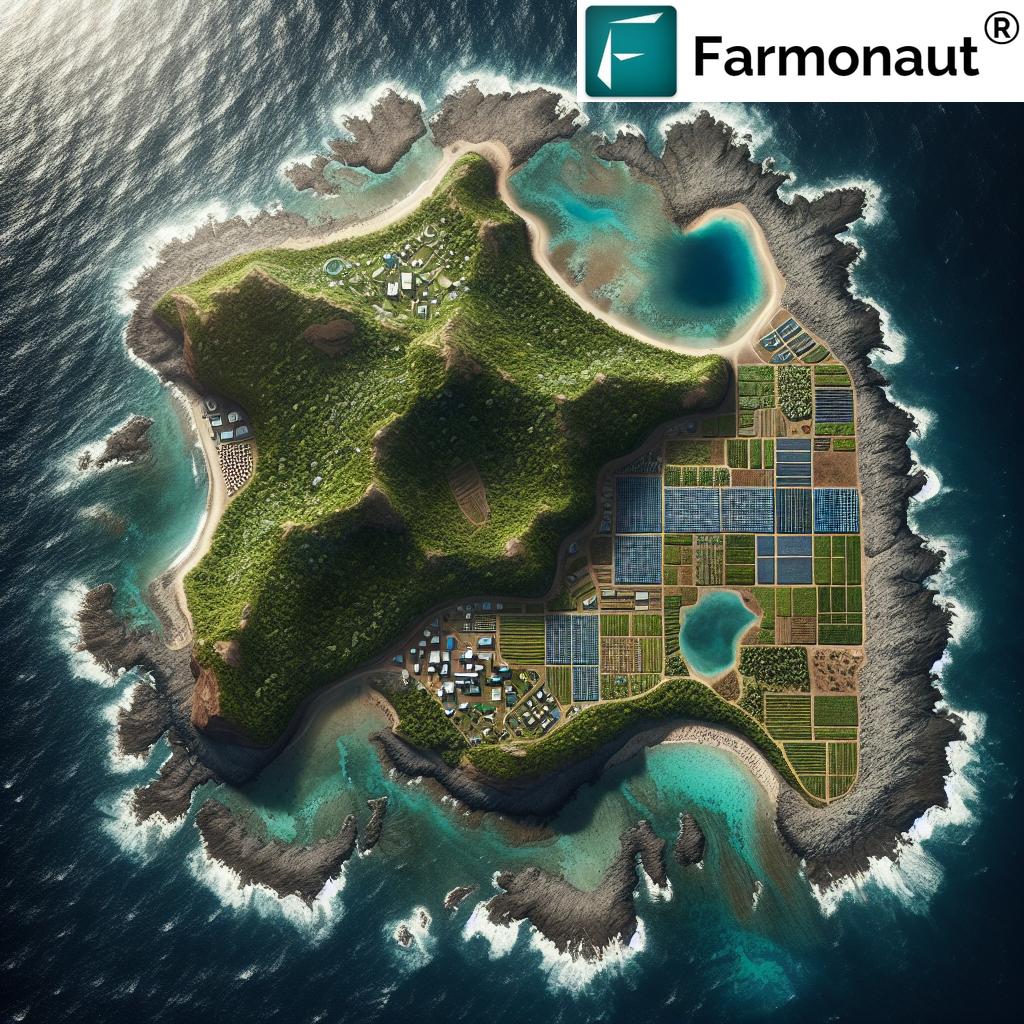Climate Resilience Strategies: How Pacific Island Nations Are Adapting to Rising Sea Levels

“Nauru, a Pacific microstate, aims to generate millions through a “golden passport” scheme for climate adaptation funding.”
As climate change continues to reshape our world, Pacific Island nations find themselves at the forefront of an unprecedented challenge. Rising sea levels threaten not just their coastlines but their very existence. In this comprehensive exploration, we delve into the innovative climate resilience strategies these nations are adopting, with a particular focus on Nauru’s groundbreaking “golden passport” scheme. This initiative not only highlights the urgent need for climate financing but also raises important questions about sovereignty, economics, and the future of vulnerable communities in a warming world.
The Looming Threat: Rising Seas and Shrinking Lands
Pacific Island nations are facing an existential crisis due to climate change. The relentless rise in sea levels poses a direct threat to their low-lying territories, fertile coastal fringes, and the very fabric of their societies. For these nations, climate change adaptation is not a matter of future planning—it’s an immediate necessity for survival.
- Sea levels in the Pacific are rising 1.5 times faster than the global average
- Many islands are experiencing coastal erosion, saltwater intrusion, and increased flooding
- Some nations are already considering mass relocation as a last resort
In this context, Nauru’s innovative approach to climate resilience funding stands out as a bold and controversial move. But before we delve into the details of their “golden passport” scheme, let’s examine the broader landscape of climate adaptation strategies in the Pacific.
Diverse Approaches to Climate Resilience
Pacific Island nations are employing a range of strategies to adapt to rising sea levels and other climate change impacts. These include:
- Coastal Protection: Building sea walls, planting mangroves, and restoring coral reefs to buffer against storm surges and erosion.
- Water Management: Improving rainwater harvesting and desalination technologies to secure freshwater supplies.
- Agricultural Adaptation: Developing salt-tolerant crops and implementing climate-smart farming practices.
- Renewable Energy: Transitioning to solar, wind, and other clean energy sources to reduce dependence on imported fossil fuels.
- Relocation: In extreme cases, planning for the managed retreat of communities from high-risk coastal areas to higher ground.
While these strategies are crucial, they all require substantial funding—a challenge for small island nations with limited resources. This is where Nauru’s innovative approach comes into play.
Nauru’s Golden Passport Scheme: A Controversial Solution
Nauru, a microstate with a population of around 13,000, has unveiled a pioneering approach to secure its future in the face of rising seas. The nation is implementing a “golden passport” scheme, selling citizenship to fund its climate resilience efforts and potential mass relocation inland.
Key details of Nauru’s citizenship-by-investment program:
- Cost: $105,000 per passport
- Expected revenue: $5.7 million in the first year, potentially rising to $43 million annually
- Benefits: Visa-free entry to 89 countries, including the UK, Ireland, UAE, and Hong Kong
- Purpose: Fund climate adaptation measures and a mass inland relocation project
President David Adeang of Nauru stated, “For Nauru, it is not just about adapting to climate change, but about securing a sustainable and prosperous future for generations to come.” This bold move highlights the urgent need for innovative solutions to ensure survival and prosperity for vulnerable communities.

The Context: Nauru’s Unique Challenges
To understand the significance of Nauru’s decision, we must consider the nation’s unique challenges:
- Geography: With a total landmass of just 21 square kilometers, Nauru is one of the world’s smallest nations.
- Environmental Degradation: Decades of phosphate mining have rendered 80% of Nauru uninhabitable.
- Economic Transition: Once wealthy due to phosphate exports, Nauru now faces significant economic challenges.
- Climate Vulnerability: Rising sea levels threaten what little habitable land remains.
These factors combine to create a perfect storm of challenges, necessitating bold and innovative solutions.
The Potential and Pitfalls of Citizenship-by-Investment Programs
While Nauru’s approach is unique in its explicit link to climate adaptation, citizenship-by-investment programs are not new. More than 60 nations worldwide offer some form of migration for investment schemes. However, these programs come with both potential benefits and significant risks.
Potential Benefits:
- Rapid influx of foreign capital
- Funding for critical infrastructure and development projects
- Diversification of the economy
Potential Risks:
- Security concerns and potential for criminal exploitation
- Reputational risks for the host country
- Potential devaluation of citizenship
Nauru’s previous attempt at a passport-selling scheme in 2003 ended in disaster when citizenship was sold to individuals later arrested for links to al-Qaeda. This history underscores the critical importance of rigorous due diligence in any such program.
“Pacific Island nations face existential threats from rising sea levels, with some considering mass relocation inland as a survival strategy.”
Comparing Climate Adaptation Strategies Across Pacific Island Nations
| Nation | Primary Climate Threat | Adaptation Strategy | Estimated Cost (USD millions) | Funding Source | Implementation Timeline | Projected Impact |
|---|---|---|---|---|---|---|
| Nauru | Sea level rise | Golden passport scheme, inland relocation | 60+ | Citizenship-by-investment | 2025-2035 | Relocation of 90% of population |
| Tuvalu | Coastal erosion | Land reclamation, artificial islands | 300 | International aid, sovereign fund | 2023-2033 | Increase land area by 8% |
| Kiribati | Freshwater scarcity | Desalination plants, water management | 85 | Green Climate Fund, bilateral aid | 2024-2030 | Secure water supply for 80% of population |
| Fiji | Extreme weather events | Climate-resilient infrastructure, early warning systems | 500 | World Bank loans, national budget | 2022-2032 | Reduce climate-related economic losses by 50% |
| Marshall Islands | Sea level rise, storm surges | Coastal protection, elevated infrastructure | 200 | US Compact funds, international grants | 2025-2035 | Protect 70% of critical coastal areas |
This comparison highlights the diverse approaches Pacific Island nations are taking to address climate change impacts. Nauru’s strategy stands out for its innovative funding mechanism, while other nations rely more heavily on international aid and traditional financing methods.
The Role of Technology in Climate Adaptation
As Pacific Island nations grapple with climate change, technology plays an increasingly crucial role in adaptation strategies. Advanced monitoring systems, sustainable agriculture techniques, and innovative infrastructure solutions are all part of the toolkit for building resilience.
In this context, companies like Farmonaut are contributing to global efforts in sustainable agriculture and environmental monitoring. While not directly involved in Nauru’s initiatives, Farmonaut’s technologies exemplify the kind of innovative solutions that can support climate adaptation efforts worldwide.
Farmonaut’s satellite-based farm management solutions and AI-driven advisory systems demonstrate how technology can enhance agricultural productivity while promoting sustainability. These tools could be particularly valuable for island nations looking to optimize their limited arable land and adapt to changing climate conditions.
Ethical Considerations and Global Implications
Nauru’s golden passport scheme raises important ethical questions and has significant global implications:
- Sovereignty and Citizenship: Does selling citizenship devalue its meaning or compromise national sovereignty?
- Global Equity: Is it fair that wealthy individuals can “buy” citizenship while climate refugees face barriers to migration?
- International Security: How can nations balance the need for funding with the risks of exploitation by criminal elements?
- Climate Justice: Should vulnerable nations be forced to resort to such measures, or should there be more robust international support?
These questions highlight the complex intersection of climate change, economics, and international relations that Pacific Island nations must navigate.
The Future of Climate Adaptation in the Pacific
As we look to the future, it’s clear that Pacific Island nations will continue to be at the forefront of climate adaptation efforts. Their experiences and innovations will likely serve as valuable lessons for other vulnerable regions around the world.
Key trends and considerations for the future include:
- Increased integration of technology in adaptation strategies
- Growing emphasis on regional cooperation and knowledge sharing
- Potential development of new international frameworks for climate migrants
- Continued innovation in financing mechanisms for adaptation and resilience
Explore Farmonaut’s API for advanced agricultural insights
While Nauru’s golden passport scheme is just one approach, it underscores the urgent need for creative solutions and adequate funding to address the existential threat of climate change. As the global community grapples with these challenges, the resilience and ingenuity of Pacific Island nations will undoubtedly play a crucial role in shaping our collective response to rising seas and a changing climate.
Conclusion: Navigating Uncharted Waters
The climate resilience strategies adopted by Pacific Island nations, particularly Nauru’s bold citizenship-by-investment program, represent a critical juncture in our global response to climate change. These initiatives highlight the urgent need for innovative solutions, adequate funding, and international cooperation to address the existential threats faced by vulnerable communities worldwide.
As we move forward, it’s crucial that we:
- Support and learn from the adaptive strategies of Pacific Island nations
- Develop more robust international frameworks for climate financing and migration
- Invest in sustainable technologies and practices that can enhance resilience
- Address the ethical implications of climate adaptation measures
- Strengthen global commitment to reducing greenhouse gas emissions
The challenges faced by Nauru and its neighbors are not just regional issues—they are harbingers of the global challenges we all face in a warming world. By supporting their efforts and learning from their experiences, we can work towards a more resilient and sustainable future for all.
Access Farmonaut’s API Developer Docs for detailed integration guidance
FAQs
- Q: What is Nauru’s “golden passport” scheme?
A: Nauru’s golden passport scheme is a citizenship-by-investment program that sells passports for $105,000 each to fund climate adaptation efforts and potential mass relocation inland. - Q: How much revenue does Nauru expect to generate from this program?
A: Nauru expects to generate $5.7 million in the first year, potentially increasing to $43 million annually. - Q: What are the main climate threats facing Pacific Island nations?
A: The primary threats include rising sea levels, coastal erosion, saltwater intrusion, increased flooding, and more frequent extreme weather events. - Q: How are other Pacific Island nations adapting to climate change?
A: Other nations are implementing strategies such as coastal protection, water management improvements, agricultural adaptation, renewable energy transitions, and in some cases, planning for relocation. - Q: What are the ethical concerns surrounding citizenship-by-investment programs?
A: Ethical concerns include potential devaluation of citizenship, security risks, equity issues in global migration, and questions about national sovereignty.
Earn With Farmonaut: Join our Affiliate Program
Earn 20% recurring commission with Farmonaut’s affiliate program by sharing your promo code and helping farmers save 10%. Onboard 10 Elite farmers monthly to earn a minimum of $148,000 annually—start now and grow your income!





